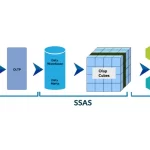AWS, or Amazon Web Services, is a comprehensive cloud computing platform provided by Amazon. It offers a wide range of cloud-based services that allow businesses, developers, and organizations to build, deploy, and manage various applications and resources without the need for on-premises hardware. Here’s a brief overview of what AWS cloud service is and what it offers:
1. Cloud Computing Platform:
AWS provides a virtual environment where users can access computing resources like servers, storage, databases, networking, analytics, machine learning, and more.
2. Infrastructure as a Service (IaaS):
AWS allows you to provision virtual servers (EC2), storage (S3, EBS), and other resources on-demand, without the need to maintain physical hardware.
3. Platform as a Service (PaaS):
AWS offers platforms that help developers build, deploy, and manage applications without worrying about the underlying infrastructure. Examples include AWS Elastic Beanstalk, AWS Lambda, and AWS Fargate.
4. Software as a Service (SaaS):
AWS provides software-based services that organizations can use directly, such as Amazon WorkSpaces for virtual desktops and Amazon Chime for communication.
5. Scalability and Flexibility:
One of the primary benefits of AWS is its ability to scale resources up or down based on demand. This flexibility allows users to adapt to changing workloads without incurring unnecessary costs.
6. Global Infrastructure:
AWS has a global network of data centers (called Regions and Availability Zones) that provide high availability, fault tolerance, and low-latency access to resources.
7. Security and Compliance:
AWS provides a secure environment with features like encryption, access control, identity management, and compliance with various industry standards (such as HIPAA, GDPR, and ISO).
8. Wide Range of Services:
AWS has a vast portfolio of services, including database management (RDS, DynamoDB), networking (VPC, Route 53), storage (S3, Glacier), machine learning (SageMaker, Comprehend), analytics (Redshift, Kinesis), DevOps (CodePipeline, CodeDeploy), and more.
9. Cost-Efficiency:
AWS uses a pay-as-you-go pricing model, where users only pay for the resources they use, offering cost-efficiency compared to traditional on-premises infrastructure.
10. Developer Tools and Ecosystem:
AWS provides a rich ecosystem of tools, SDKs, and integrations to help developers build, test, and deploy applications efficiently.
In summary, AWS is a leading cloud computing platform that offers a wide range of services to meet the needs of different types of users, from startups to large enterprises. It enables users to leverage cloud technology to innovate and scale without the burden of managing physical infrastructure.


















































